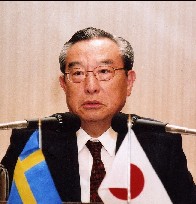��From ��Sketch of Umekichi Yoneyama��-Group Surrounding Yoneyama��
June 14, 2006
Mr. Hirofumi Taniuchi,
Auditor,
Rotary Yoneyama Memorial Foundation, Inc.
 ��Umekichi Yoneyama was born as the third son of Takezo Wada on February 4 in the 4th year of Keio (1868). When Umekichi was 5, his father, Takezo, passed away at the age of 43. Umekichi, who lived in Mishima, which was the birth home of his mother, was asked by the Yoneyama family, a local prosperous farmer family, and became an adopted child when he was a senior student of the elementary school. It was expected that in the future he would marry the daughter, Haru, and take over the family affairs. Numazu Middle School, where Umekichi attended for 2 years from the age of 14, was a somewhat progressive school, having several foreign teachers on its staff. Here his desire to ��study in America�� was born in Yoneyama.
��Umekichi Yoneyama was born as the third son of Takezo Wada on February 4 in the 4th year of Keio (1868). When Umekichi was 5, his father, Takezo, passed away at the age of 43. Umekichi, who lived in Mishima, which was the birth home of his mother, was asked by the Yoneyama family, a local prosperous farmer family, and became an adopted child when he was a senior student of the elementary school. It was expected that in the future he would marry the daughter, Haru, and take over the family affairs. Numazu Middle School, where Umekichi attended for 2 years from the age of 14, was a somewhat progressive school, having several foreign teachers on its staff. Here his desire to ��study in America�� was born in Yoneyama.
��At the age of 16, Umekichi, without the permission of his adoptive family, went to Tokyo to study. Before embarking to the United States, he studied English at the Tokyo Eiwa Gakuin (predecessor to Aoyama Gakuin).
��At the age of 20, when Umekichi went to the United States with just his shirt on his back, the first place he sought shelter was at the ��Evangelist Society��, where he tutored under Yoitsu Honda and Merriman Harris. M. Harris recommended that Umekichi go on to Wesleyan University in Ohio. Harris wanted Umekichi to become a missionary. Yoneyama had wanted originally to become a writer, and wanted to be a journalist, and he is said to have studied law and political science at Syracuse University and University of Rochester, but the details are not known.
��In the spring of 1895, Yoneyama returned to Japan. He was 28. Wanting to be a journalist, he called on Jiji Shinpo, run by Yukichi Fukuzawa, but ultimately joined Mitsui Bank. It was Shiro Fujita who had introduced Yoneyama to Mitsui Bank. Fujita befriended Yoneyama when Yoneyama came to Tokyo to enter Koka Doi Private School. When they again met, Fujita had become Director of the Agricultural Policy Bureau of the Ministry of Agriculture. Fujita was the son-in-law of Kaoru Inoue. Kaoru Inoue was also an advisor to Mitsui Group. At that time, the recruiter at Mitsui was Hikojiro Nakamigawa. Nakamigawa was a child of the elder sister of Yukichi Fukuzawa, or his nephew. Nakamigawa adopted the ��section system�� that had been adopted by many companies into Mitsui. For this he needed school graduates. He hired his juniors from Keio University, Raita Fujiyama, Ichizo Kobayashi, Sanji Muto, Toyoji Wada, Ginjiro Fujiwara, Umeshiro Suzuki, Osuke Hibi, Shigeaki Ikeda, and later also hired Yoneyama. Nakamigawa created what is now referred to as Keiretsu. People starting from Raita Fujiyama became active at the affiliated companies, but Shigeaki Ikeda and Umekichi Yoneyama remained until the end, managing Mitsui Bank.
��Tanetaro Megata makes his appearance in 1917. Megata was 14 years elder to Yoneyama, and is the son-in-law, husband of the third daughter of Kaishu Katsu. From his connection of having Kaishu Katsu providing a recommendation for a title to the book ��Commodore Perry��, which Yoneyama published in 1896, Megata invited Yoneyama to become a member of the ��Government Dispatched Fiscal Economy Committee��, to make an observational tour of the United States that had joined the First World War. Yoneyama gained his way into the leading financiers of Japan. Around this time, he visited Kisoji Fukushima of Mitsui & Co., in Dallas, where he attended as a guest at the Dallas Rotary Club, his first opportunity of learning about the Rotary Club.
��During this time, Yoneyama had many opportunities to meet people. Yoneyama strongly appreciated the value and importance of such acquaintances. At the same time, he felt a strong sense of resistance against the fact that the aristocracy and nepotistic cliques ran the society, and that he had to rely on them. This is what led him to turn his eye to the RC as ��a rational place to build camaraderie�� and try to introduce the Rotary Club into Japan.
��Yoneyama, the father of modern trust business, in 1914 at the age of 47, while still active, commented in his essay, ��Theory of New Retirement��.
����Those who have achieved fame and fortune still have an obligation to repay his moral indebtedness to society.�� This is the thinking that, ��According to Noblesse Oblige, there is a responsibility to repay his moral debts to society corresponding to his state in life��. I can sense the root of Umekichi Yoneyama��s thoughts, who devoted his life to social welfare activities as a private sector undertaking. It was unprecedented and likely never to be seen again on the same scale.
��